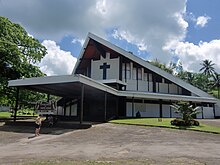
Back Rilijin long Vanuatu Bislama Religion au Vanuatu French Религия в Вануату Russian Feja në Vanuatu Albanian

Christianity is the largest religion in Vanuatu.[1] [2]
Percentage of Religions (2020 Census)
The Presbyterian Church of Vanuatu remained the largest religious denomination in the country, though its share declined from 35.8% in 1989 and 27.9% in 2009 and then stabilised to 27.2% in 2020. The Seventh-day Adventist Church was the second-largest group with representing 14.8% of the population. This was followed by the Anglican and Catholic Churches, each accounting for just over 12% of the population.[2]
Members of other denominations, including the Church of Christ, Assemblies of God, Apostolic Church, Church of Latter-day Saints, and those adhering to Customary beliefs, made up 20.3% of the population. Individuals without a religious affiliation accounted for 1.4%. The category "Other" encompassed 88 different religions, with membership ranging from one person to over 2,000.[2]
Between 2009 and 2020, the Seventh-day Adventist Church and the Church of Christ experienced significant growth, while the Anglican Church's numbers remained relatively unchanged. Although small in proportion, the number of people without religious affiliation grew substantially during this period.[2]
Religious composition varied greatly across provinces. In Penama and especially Torba, the Anglican Church was predominant, while the Presbyterian Church was the main religion in Malampa and Shefa but had minimal presence in Torba and Penama. Catholicism was particularly strong in Penama and Malampa. Sanma had a significant Presbyterian population but also displayed the most diverse mix of religions. In Tafea, slightly more than one in six people identified Customary beliefs as their religious affiliation.[2]
As of 2020, the population of approximately 300,000 people speak as many as 145 languages throughout the island nation.[3] Approximately 82% of the population of Vanuatu is Christian. An estimated 28% is Presbyterian, 12% Roman Catholic, 15% Anglican, and 12% Seventh-day Adventist.[4] Groups that together constitute 15% include the Church of Christ ,[5] the Apostolic Church, Assemblies of God, The Church of Jesus Christ of Latter-day Saints, Jehovah’s Witnesses and some Protestant denominations.[6]
The John Frum Movement, a political party that also is an indigenous religious group, is centered on the island of Tanna and includes about 5% of the population.[6] The Baháʼí Faith, Muslims, Jehovah's Witnesses, and the Church of Jesus Christ of Latter-day Saints (Mormons) also are active.[6] There are believed to be members of other religions within the foreign community; they are free to practice their religions, but in 2007 they are not known to proselytize or hold public religious ceremonies.[7]
- ^ "Vanuatu | History, People, & Location". Encyclopedia Britannica. Retrieved 2021-10-23.
- ^ a b c d e "Vanuatu 2020 National Population and Housing Census: Analytical Report - Volume 2 | Statistics for Development Division". sdd.spc.int. Retrieved 2025-01-04.
- ^ Barbour, Julie; Daly, Nicola. "People on Vanuatu's Malekula Island speak more than 30 Indigenous languages. Here's why we must record them". The Conversation. Retrieved 2021-10-23.
- ^ United States Department of State, Office of International Religious Freedom (2020). "Vanuatu 2020 International Religious Freedom Report" (PDF).
- ^ "World Convention » Vanuatu". Retrieved 2012-06-09.
- ^ a b c US State Dept 2022 report
- ^ Cite error: The named reference
reportwas invoked but never defined (see the help page).